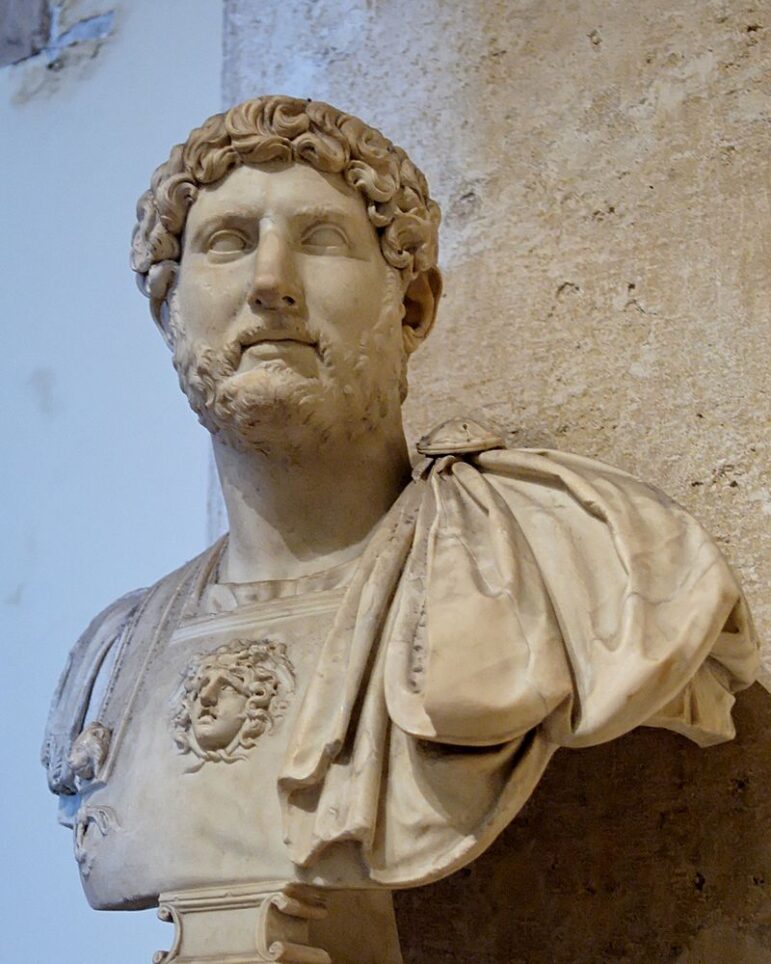TWH – Alzheimer’s disease is a progressive and irreversible neurological disorder that primarily affects cognitive function, memory, and behavior. It is the most common cause of dementia, accounting for a significant portion of dementia cases worldwide. It devastates families and, while most common in individuals over 65 years old, it has been reported among younger people. A 19-year-old man in China is the youngest person ever to be diagnosed with Alzheimer’s disease.
The progression of Alzheimer’s disease typically involves a gradual decline in memory, thinking abilities, and the ability to perform everyday activities. In the early stages, individuals may experience mild memory loss and difficulty concentrating, but as the disease advances, it can lead to severe cognitive impairment, loss of language skills, and changes in personality and behavior.

Bust of Emperor Hadrian at the Capitoline Museums of Rome. [public domain]
Scholars, and probably most people, have assumed that Alzheimer’s disease, which was first described in 1906, and similar age-related dementia have been a persistent issue throughout history, but only recently medically identified. A new analysis of classical Greek and Roman medical texts challenges this idea.
A new study published this week in the Journal of Alzheimer’s Disease challenges the notion that Alzheimer’s disease and related dementias (ADRD) have been with us all along. Rather, these dementias may be a contemporary affliction.
The research is driven by the limited references to significant cognitive decline in ancient Greek and Roman texts. These historical accounts primarily focused on the physical challenges associated with aging rather than delving into advanced cognitive impairments.
The study, led by USC researchers suggests that severe memory loss, prevalent in contemporary society, was exceptionally rare 2,000 to 2,500 years ago during the era of The Greek “Father of Medicine” Hippocrates, the Greek Pliny the Elder philosopher Aristotle, the ancient Greek physician Galen, and the Roman naturalist Pliny the Elder. All three were famous for recording their observations.
The ancient Greeks acknowledged that aging often brought about memory issues resembling what we now recognize as mild cognitive impairment (MCI). However, they did not observe anything resembling a significant loss of memory, speech, and reasoning akin to Alzheimer’s and other forms of dementia.
Dr. Caleb Finch, a professor at the USC Davis School of Gerontology whose research focuses on aging in humans, with a specialization in cell biology and Alzheimer’s disease, and his co-author, Dr. Stanley M. Burstein, a historian at California State University, Los Angeles, meticulously examined a substantial body of ancient medical writings by Hippocrates and his followers. While these texts catalog various ailments of the elderly, such as deafness, dizziness, and digestive disorders, there is no mention of memory loss.
In the subsequent centuries in ancient Rome, a few references emerge. Galen noted that around the age of 80, some elderly individuals began to experience difficulty learning new things. Pliny the Elder recounted an incident where the Roman general, statesman, and renowned orator Valerius Messalla Corvinus forgot his own name.
Cicero astutely observed that “elderly silliness” is characteristic of irresponsible old men, but not all elderly individuals. The mentions about cognitive decline were present but not in a manner suggesting disease and certainly not an epidemic.

MJT Image
In other words, Greeks acknowledged memory issues associated with aging, resembling mild cognitive impairment (MCI), but there is no evidence of major memory loss, speech impairment, or reasoning problems akin to Alzheimer’s and other dementia types.
“The ancient Greeks had very, very few — but we found them — mentions of something that would be like mild cognitive impairment,” said Finch. “When we got to the Romans, and we uncovered at least four statements that suggest rare cases of advanced dementia — we can’t tell if it’s Alzheimer’s. So, there was a progression going from the ancient Greeks to the Romans.”
Ancient writers recognized the toxicity of lead-containing materials, little progress was made in addressing the issue until well into the 20th century. Some scholars even attributed lead poisoning as a factor in the decline of the Roman Empire.
Finch suggests that as Roman cities became more densely populated, pollution increased, potentially contributing to a rise in cases of cognitive decline. Roman aristocrats inadvertently exposed themselves to the potent neurotoxin lead by using lead cooking vessels, lead water pipes, and even adding lead acetate to sweeten their wine.
With no demographic or prevalence data from ancient Greece or Rome available, the researchers looked for modern statistical models and evidence.
Finch turned to the Tsimane Amerindians, an Indigenous group in the Bolivian Amazon, as a model for ancient aging due to their preindustrial, physically active lifestyle, and psychically demanding lives, while also having low dementia rate that is in stark contrast to the higher dementia rates in the United States and the developed world. Previous research at USC has found that “among older Tsimane people, only about 1% suffer from dementia. In contrast, 11% of people aged 65 and older living in the United States have dementia, according to the Alzheimer’s Association.
The Tsimane people also have very low cardiovascular disease. “The Tsimane data, which is quite deep, is very valuable,” Finch said. “This is the best-documented large population of older people that have minimal dementia, all of which indicates that the environment is a huge determinant of dementia risk. They give us a template for asking these questions.”
The researchers cautioned that “no ancient account of cognitive loss is equivalent to modern clinical data.” Nevertheless, the new research supports the concept that Alzheimer’s disease and related dementias are predominantly products of contemporary environments and lifestyles, implicating sedentary behavior and exposure to air pollution.
The Wild Hunt is not responsible for links to external content.
To join a conversation on this post:
Visit our The Wild Hunt subreddit! Point your favorite browser to https://www.reddit.com/r/The_Wild_Hunt_News/, then click “JOIN”. Make sure to click the bell, too, to be notified of new articles posted to our subreddit.